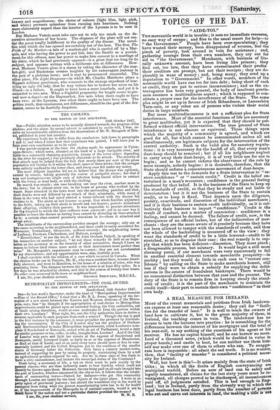TOPICS OF THE DAY.
" AIDE-TOI."
THE mercantile world is in trouble ; it sees no immediate resource, no easy way of escape ; and flies to the usual resort for help—to "the Government.' People have been over-speculating ; they have wasted their money, been disappointed of returns, feel the pinch of poverty, look around in vain for assistance ; and, gathering courage from their own numbers they cry out for aid to "the Government." Merchants, with business of lite- rally unknown amount, have been living like princes; they find out, too late, that they have overestimated their profits their creditors are prompt, but not their receipts ; they are de- plorably in want of money ; and, being many, they send up a deputation to "Government." In other words, members of the mercantile world have run too far into debt ; being short of cash or credit, they are put to serious inconvenience; and as the ex- travagance has been very general, the body of insolvent gentle- men assumes a multitudinous aspect ; which is supposed to con- stitute a proper case for the interference of the State. The same plea might be set up in favour of Irish Ribandmen, or Lancashire Turn-outs, or any other set of persons who violate their social duties in large numbers.
But mere multitudinousness is not a sufficient plea for State interference. Most of the essential functions of life are necessary to great multitudes, yet it is expected that they should be per- formed without official intervention. The true ground of State interference is not obscure or equivocal. Those things upon which the majority of a community is agreed, and which are good for all, but which cannot be consummated unless all act simultaneously, are legitimate subjects for the intervention of the central authority. Such is the valid plea for sanatory regula- tions: it is very necessary for the health of all, that every man's dust-heap should be removed ; but if all his neighbours neglect to carry away their dust-heaps it is of very little use for one to begin ; and as he cannot enforce the observance of the rule by mere example, nobody begins : it is desirable, therefore, that the State should enforce a consentaneous movement of duet-heaps.
Apply this test to the demands for a State intervention to "re- store confidence " or " sustain credit." Credit is the belief en- tertained in a man's resources ; confidence is the general feeling produced by that belief. It is the business of the State to keep up the standards of credit, so that they be steady and not liable to deterioration : but it is not the business of the State to sustain credit, or to keep it fixed. That depends upon the diligence, probity, exactitude, and discretion of the individual merchants ; i
and it s their business to sustain credit individually, as it is col- lectively, their business to impart "confidence." Credit is the
result of conduct, not a matter of convention : confidence is a
feeling, and cannot be decreed. The failure of credit, now, is the consequence of no official laches, but of the indiscretion of mer- chants : they are the more aware of it precisely because they have not been allowed to tamper with the standards of credit, and thus the whole of the backsliding is measured off to the view : they want the standards of credit to be a little lowered—credit to be stretched, so as to disguise their case : the real remedy is to sup- ply that which has been deficient—discretion. They must pinch ; a disagreeable process, but salutary. It would beget a still more alarming panic, if our merchants were very numerously to fail in another essential element towards mercantile prosperity—in probity ; but they would do little in such case to 'restore con- fidence" by calling on the State to make merchants honest, still less if they- were to obtain a subsidy for supplying the defal- cations in the estates of fraudulent bankrupts. There would be no economical distinction between that case and the present. The duty of the State is to remain firm in keeping steady the stand- ards of credit ; it is the part of the merchants to maintain the credit itself—their part to sustain their own " confidence " in their own body.
























 Previous page
Previous page